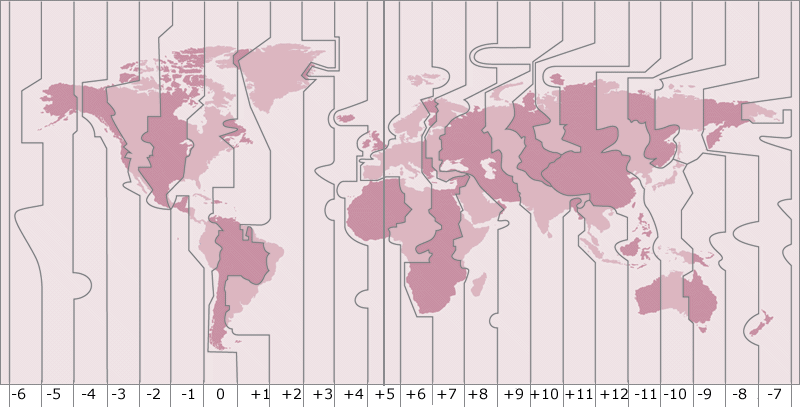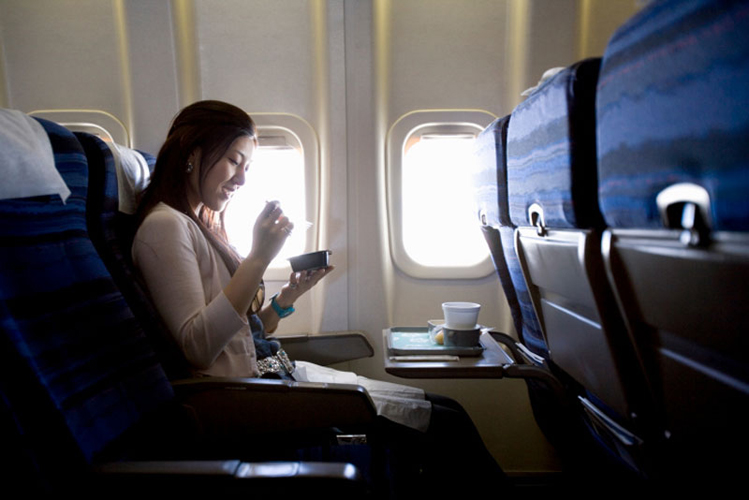Reducing the Effects of Jet Lag
When you travel by air across several time zones (see Traveling through time zones),
your sleep-wake cycle and the levels of melatonin in your body are
initially out of kilter with the local day-night cycle at your
destination. This can lead to the various symptoms of jet lag (see What is jet lag?). To reduce the effects of jet lag, try to follow the advice here,
which will help you synchronize your body clock to local conditions.
Avoiding natural bright light at the wrong time is probably the most
important factor in reducing jet lag.
Traveling through time zones
The world is divided
into 24 zones of local time, which correspond to every 15 degrees of
longitude and the 24 hours of a day. However, as a result of political
and regional issues the time-zone map of the world does not consist of
equally spaced lines (see here).
Whether you fly from
east to west or from west to east, the more time zones you cross the
more jet lag you are liable to experience. Many people report that their
jet lag is worse when they fly from west to east, which is the same
direction in which the Earth spins on its axis.

Advice for reducing jet lag
Before you go
Use a calculator to help
you figure out the best way to time your exposure to light before and
after your trip. Several calculators can be accessed for free on the
Internet–for example, www.bodyclock.com.
Rest
Try to be as well rested as possible before you travel. Getting on the flight exhausted or stressed will not improve your trip.
Comfort
If you can afford
it, fly business or first class so you can rest adequately during the
flight (especially if you’re flying for business reasons). If you are
traveling in economy class, try to ensure that you have as much room
around your seat as possible (minimize the bulk of your hand luggage).
Get up and stretch your legs on a regular basis.
Sleep
If you are traveling on a
night flight, try to get some sleep. Recline your seat and use the eye
shades to shut out the cabin light and ear plugs to minimize the noise.
Food, drink, and exercise
Drink plenty of
water during the flight, stretch regularly, and walk around in the
plane if possible. Avoid alcohol and caffeinated drinks, such as tea,
coffee, and colas, because they cause water loss and can disrupt your
rest. Eat light meals.
Once you arrive
On arrival at
your destination, try to fit your sleep–wake pattern to the pattern at
your destination. For instance, if you arrive early in the morning,
expose yourself to daylight and try to stay awake. If you arrive in the
evening, try to go to bed at a reasonable bedtime for you.
Medication
Hypnotic medications that
are short-acting can be useful to ensure that you sleep not only during
the flight, but also on arrival at your destination.
Melatonin
There is some evidence that, if properly timed, melatonin can assist with alleviating jet lag (see Is melatonin useful in combating jet lag?). Always use a licensed, quality-controlled preparation of melatonin.


Strategies for dealing with shift-work
Here are some tips you can follow for you to sleep better if you are a shift-worker:
Optimize your sleep hygiene. Eye shades and ear plugs are especially useful if you sleep during the day.
Attention to bedroom environment. Try to keep the bedroom cool, dark, and as quiet as possible.
Exercise regularly. Avoid strenuous exercise before bedtime.
Plan to end your sleep as close to the start of the shift as possible. If necessary, take a nap before the night shift.
Eat a balanced diet. Smaller meals are better for those starting a night shift.
Avoid
caffeine and bright light before the end of a night shift to prevent
delays in getting to sleep. In very bright environments, wear sunglasses
when you are traveling home.
If
you are very sleepy at the end of the night shift, make safe travel
arrangements to get home or take a nap before setting off.
